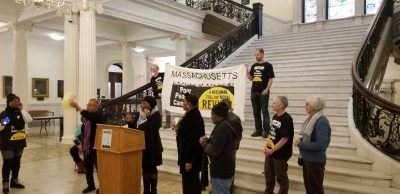
Advocates for poor and disenfranchised people in the Commonwealth held a rally on the steps of the Massachusetts State House Monday. Rallygoers later entered the State House after to present a list of demands including calls for a tax shakeup, voter equality, gun control, prison reform and increased environmental sustainability.
The rally, hosted by the Massachusetts Poor People’s Campaign, was part of the organization’s campaign, “A National Call for Moral Revival.” The campaign’s goal is to “challenge the evils of systemic racism, poverty, the war economy, ecological devastation and the nation’s distorted morality,” according to their website.
Several activists spoke at the rally about their stories of hardship to the sounds of cheers and tambourines. Strong winds threatened to blow away the protestors’ signs that read messages like, “Forward Together, Not One Step Back,” and, “Voter Suppression is Violence.”
The protestors’ demands, detailed in a fact sheet from the Mass. Poor People’s Campaign, requested that the state end policies that “exacerbate inequalities” for people of color, require the wealthy to “pay their fair share,” regulate firearms to “demilitarize our communities” and adopt environmentally-friendly practices.
Savina Martin, the co-chair of the Mass. Poor People’s Campaign, said the demands of the Poor People’s Campaign are for the rights of every person.
“This, it’s not about black or white, it’s not about right or left,” Martin said. “It’s not about Democratic or Republican. This is about the lives of millions of people who have a right to live a secure life, a life of liberty.”
Martin said the demands of the organization at the rally were similar to the three evils Martin Luther King Jr. described at New York City’s Riverside Church in 1967 during the Vietnam War, which were racism, poverty and war.
“‘The Poor People’s Campaign: A National Call for Moral Revival’ has five evils, which are… the systemic racism, systemic poverty, ecological devastation, the war economy and the distorted moral narrative,” Martin said.
Martin said she thinks the campaign’s demands were heard inside the State House.
“When I read the demands, we all noticed that people [inside the State House] were clapping, they were nodding their heads,” Martin said.
Mike Sax, a 40-year-old activist from Brookline who attended the rally, wrote in a Facebook message that the rally lifted up the collective voices of all the poor and marginalized people in the Commonwealth.
“Like a spirit of justice [their voices] might burst through those doors to carry a message from the State House steps into the hearts of our elected representatives the message ‘Somebody’s hurting our people and it’s gone on far too long,’” Sax wrote.
Sax wrote the activists wanted to address legislative leaders directly in order to convince the lawmakers to take action in support of Massachusetts’ disadvantaged populations.
“We marched through those doors into our house to deliver demands to the senate president and house speaker,” Sax wrote, “spelling out the truth about those ways in which our people are hurting.”
Roxbury resident Charlie Keller, an activist for the Poor People’s Campaign who also attended the rally, wrote in a Facebook message that the movement is a response to inequality in our society.
“From my point of view, the Poor People’s Campaign is a welcome infusion of moral witness against a society, and particularly a corporate ruling class, that systematically oppresses, exploits, and abandons its poor and sick, its elders and young, its black and brown,” the 39-year-old wrote.
Keller wrote that the rally was one small part of a larger movement to harness the principle of civil disobedience and inspire popular action against a system that heavily advantages the country’s wealthy population.
“The PPC’s moral witness and civil disobedience function as important sparks to the national conscience,” Keller wrote, “helping grab public and media attention, and helping to inspire a movement.”
However, he noted, organizations such as the Poor People’s Campaign would have to go beyond rallies and demonstrations and partner with the government to pass concrete legislation instituting systemic change.
“To overcome the power of an entrenched economic and political oligarchy that has for decades rammed more profits for the rich down the throats of a public that consistently favors progressive and social-democratic redistribution programs,” Keller wrote, “… these methods will likely need to be combined with more specific and radical policy demands.”
Rachel Wyon, 67, an activist from Cambridge who also attended the event, wrote in a Facebook message a woman spoke at the rally about personal hardships faced by poor people across Massachusetts.
“In spite of having Section 8 [a housing voucher,] she cannot find [an] apartment since many landlords want higher rents,” Wyon wrote. “The system is broken.”

















































































































